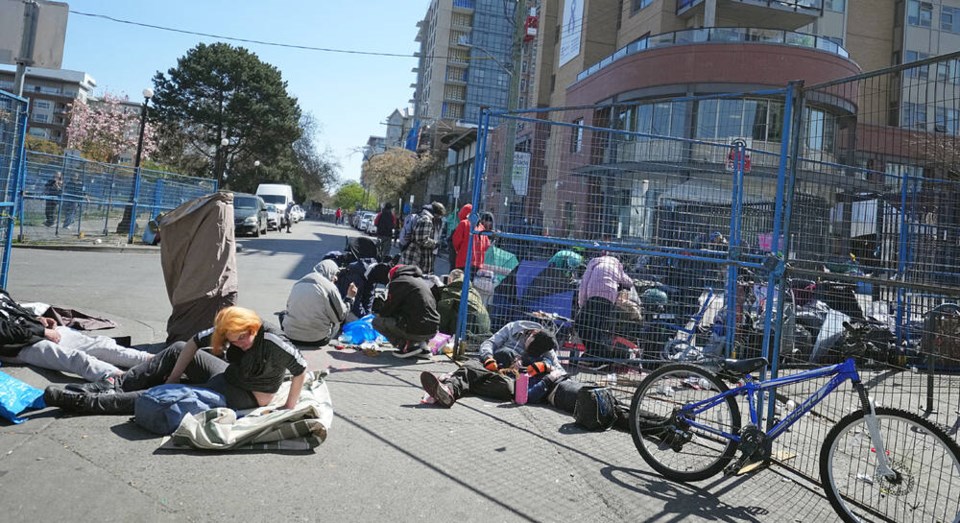When an incapacitated or mentally failing grandparent or a violent kid needs care and management, we don’t leave them to hurt themselves or cause pain to others.

The lengthy, cleverly titledGlobe and Mailpiece “Pandora’s Blocks” at the end of May was a highly detailed and predictably heartbreaking, no-winners narrative about the state and fate of Pandora Avenue — Victoria’s epicentre of homelessness, fentanyl and other addictions, random violence, wide-ranging mental disorder, and a springboard for downtown-wide unmanaged behaviour and the spread of filth, theft and predation.
The article discussed impacts on businesses, cultural institutions, property generally, and on the public’s normal functioning, the physical dangers that extend even to health and other care workers, the small and temporary successes sandwiched between large and conspicuous failures and disappointing missteps, the policy and ideological skirmishes, the stormy weather of public and stakeholder viewpoints.
The impacts are unmistakable: downtown’s degraded physical appearance, rent-a-cops, merchandise in security showcases, economic viability threatened, diminished feelings of public relaxedness, effects on cultural and social vitality throughout the city centre.
And all of this at a time when our city is confronting wider social and economic challenges that raise questions about the continuing utility of downtown. One wonders if the entire downtown daily income, with 10% of storefronts dark and the Bay breathing its last, is exceeded by Costco’s.
Homelessness and addiction — let’s call it street life — are nasty, values-charged social topics, and if you step in, you get dirty. It’s easy, discussing them, to feel like a right-wing somebody you never wanted or considered yourself to be.
At the same time, it’s easy to drift into an abstracted social blamefest — emotionally satisfying, but solutionless.
Remember: The financial and social costs to our city centre are staggering. Vacant storefronts and empty offices tell part of the story. Other businesses that would leave downtown if their leases were up tells the balance (see ominousTC storyJune 12).
The Latin phrase in loco parentis means in the place or role of the parent. We understand this idea instinctively when, for example, an incapacitated or mentally failing grandparent or a violent kid need care and management. We don’t leave them to hurt themselves or cause pain to others. If we do, we pay a price.
Pandora Avenue and other outposts around downtown are filled with similarly lost and damaged people.
They must all — that word again: all — be placed in involuntary care and protection, appropriate residential facilities that they cannot leave until and unless, after the shortest possible time, they show signs of recovery and success at self-management.
Relocate Our Place (a great care centre) and have it run one or more such facilities. That is, remove the functional appeal of Pandora Avenue. Render Pandora and the rest of downtown addict-, predator- and homeless-free and keep it that way until people get the message: Downtown’s a no-go.
In such a facility, as in Our Place now, people would be given protection: shelter, food, medical care, showers and clean clothing and treatment, counselling, friendship.
“But that’s jail with padded bars,” social advocates may say. The answer: “And what’s downtown, a playground?”
“But the Charter of Rights and Freedoms!”
“Oh, you mean the freedom to be addicts, to overdose and die, to commit acts of violence, to light fires in doorways and use the downtown public realm as a toilet, to produce endless public damage. Somebody with a needle in his/her arm, squatting catatonically … those freedoms?
Somebody says: “Slippery slope.”
But past failures to respond, the paralysis, the delay, is social insanity by another name and is, much more visibly, tangibly, its own slippery slope.
These last thoughts. In the same way that oil companies favour wide highways and new car purchases, or the snack-food industry counts on our lack of impulse control, the fentanyl gangs and dealers count on drug addiction. Addiction is their business model.
The current situation harms the homeless and addicted themselves. It harms downtown and our neighbourhoods. It harms civic society. This is anarchy and social violence. Why does common sense vanish around an issue like this?
Oh, right. We really need a new $200-million pool — clearly the city’s and the citizens’ highest priority, while downtown collapses.
Provincial assistance is critical? Then how about the mayor and the entire council stand on the legislature lawn with placards, every day, all day long, until the province can’t take it and forks over the necessary resources.
Street life is a horrific and consequential social problem. Sorry, but if you hear “marginalized,” run the other way. It’s code for inertia.
[email protected]
Gene Miller is the founder of Open Space, founding publisher of Monday Magazine, originator of the Gaining Ground urban sustainability conferences, founder/developer of ASH houseplexes, and currently writing “Nothing To Do: Life in a Workless World.” He’d be pleased to receive and respond to your thoughts.